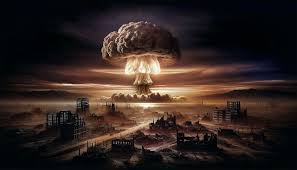”And this shall be the plague wherewith the LORD will smite all the people that have fought against Jerusalem; Their flesh shall consume away while they stand upon their feet, and their eyes shall consume away in their holes, and their tongue shall consume away in their mouth.” — Zechariah 14:12, KJV
Recently, I watched an interview with Annie Jacobsen, an investigative journalist and New York Times bestselling author who talks about the devastating effect of nuclear war with Steven Bartlett in The Diary of a CEO.
During the interview with her latest published book Nuclear War: A Scenario, Jacobsen talks about the horrific descriptions of what will happen if nuclear war occurs. Bartlett says, “Nuclear Armageddon essentially means the world is destroyed.” Jacobsen responded: “..when you get to the end of the book [Nuclear War: A Scenario] which happens in 72 minutes and that comes from something that former strat-com director General Keeler said to me when we were discussing and interviewing, and I said.. about what could happen if there was a nuclear exchange between Russia and the United States and he said, ‘The world could end in the next couple of hours.‘” During the interview, she summarized the aftermath details of nuclear war, saying: “After nuclear wars, the survivors will envy the dead.“
Those words were instilled in my mind and it is such a scary scenario if that happens. Nuclear war is not a joke!
In the shadow of global political tensions and the relentless advancement of military technologies, the specter of nuclear war looms ever-present. While the world has witnessed the horror of nuclear attacks in Hiroshima and Nagasaki, a full-scale nuclear conflict would be exponentially more catastrophic. The potential for unprecedented human suffering and environmental destruction calls for a renewed understanding of the horrific effects of nuclear war.
Immediate Destruction and Human Casualties
The detonation of a nuclear weapon results in an immediate and unparalleled burst of energy. Within milliseconds, a fireball forms, reaching temperatures of several million degrees Celsius, vaporizing everything in its vicinity. Buildings, infrastructure, and human beings within a radius of several kilometers would be obliterated instantly. The shockwave following the explosion would level structures over a much broader area, causing additional casualties and widespread devastation.
Radiation released by the explosion would kill or injure those who survive the initial blast. Acute radiation syndrome, marked by symptoms such as nausea, vomiting, diarrhea, and hemorrhaging, would afflict survivors, leading to death within days to weeks for those exposed to high doses. Long-term exposure to radiation increases the risk of cancers, genetic mutations, and other health issues, affecting not only the immediate survivors but also future generations.

Environmental Catastrophe
The environmental consequences of nuclear war extend far beyond the initial explosions. The intense heat and fires ignited by nuclear blasts would release vast amounts of soot and ash into the atmosphere, blocking sunlight and potentially triggering a “nuclear winter.” This severe and prolonged drop in temperatures could last for months or even years, disrupting agricultural production and leading to global food shortages and famine.
The release of radioactive particles into the environment would contaminate air, water, and soil, rendering large areas uninhabitable. The fallout would spread globally, carried by wind and weather patterns, affecting regions far removed from the blast sites. This radioactive contamination would have devastating effects on ecosystems, killing plants and animals and disrupting food chains.
Societal Collapse
The social and economic repercussions of nuclear war would be profound and long-lasting. The immediate loss of life and the destruction of cities would devastate the economy and infrastructure of affected nations. Healthcare systems would be overwhelmed by the sheer number of casualties, while the scarcity of resources would lead to widespread panic, civil unrest, and potentially the collapse of governments.
Survivors would face a world of scarcity and insecurity, where basic necessities like food, water, and medical care become scarce commodities. The psychological impact of witnessing such widespread destruction and loss would lead to a societal crisis, with mental health issues such as post-traumatic stress disorder (PTSD) becoming prevalent.
Global Consequences
Nuclear war is not a localized event; its repercussions are global. The interconnectedness of modern societies means that the economic and environmental impacts would reverberate worldwide. Global trade would be disrupted, economies would falter, and international relations would be strained, potentially leading to further conflicts.
The humanitarian crisis ensuing from nuclear war would require a coordinated global response, yet the very fabric of international cooperation might be torn apart by the devastation. The resources needed for recovery and reconstruction would be immense, potentially beyond the capacity of even the wealthiest nations.
The Moral Imperative for Prevention
The potential consequences of nuclear war underscore the imperative for disarmament and the prevention of nuclear conflict. The existential threat posed by these weapons necessitates a commitment to diplomacy, dialogue, and international agreements aimed at reducing nuclear arsenals and preventing proliferation.
As the world navigates the complexities of geopolitics and security, the catastrophic potential of nuclear war serves as a stark reminder of the urgent need for peace and cooperation. The lessons of the past and the scientific understanding of the present make it clear: the cost of nuclear war is too high, and humanity must strive to ensure that such a disaster never occurs.
Conclusion
The effects of nuclear war would be catastrophic, with immediate and long-lasting consequences for human life, the environment, and global society. The destruction, radiation, environmental impact, and societal collapse that would follow a nuclear conflict highlight the urgent need for international efforts to prevent such a scenario. It is a moral and practical imperative to work towards a world free of the threat of nuclear war, ensuring a safer future for generations to come.
Latest Posts
- China dams release water, submerging more cities and flooding more streets |
- Terror attack in Dagestan, Russia kills police, priest and destroyed churches and synagogues |
- Why is Jesus an “Archangel”, not God Almighty himself? |
- Terrorist weapon supplier killed in Lebanon strike, Israel reports |
- PH vloggers Rosmar Tan and Rendon Labador declared ‘persona non grata’ in Palawan |

